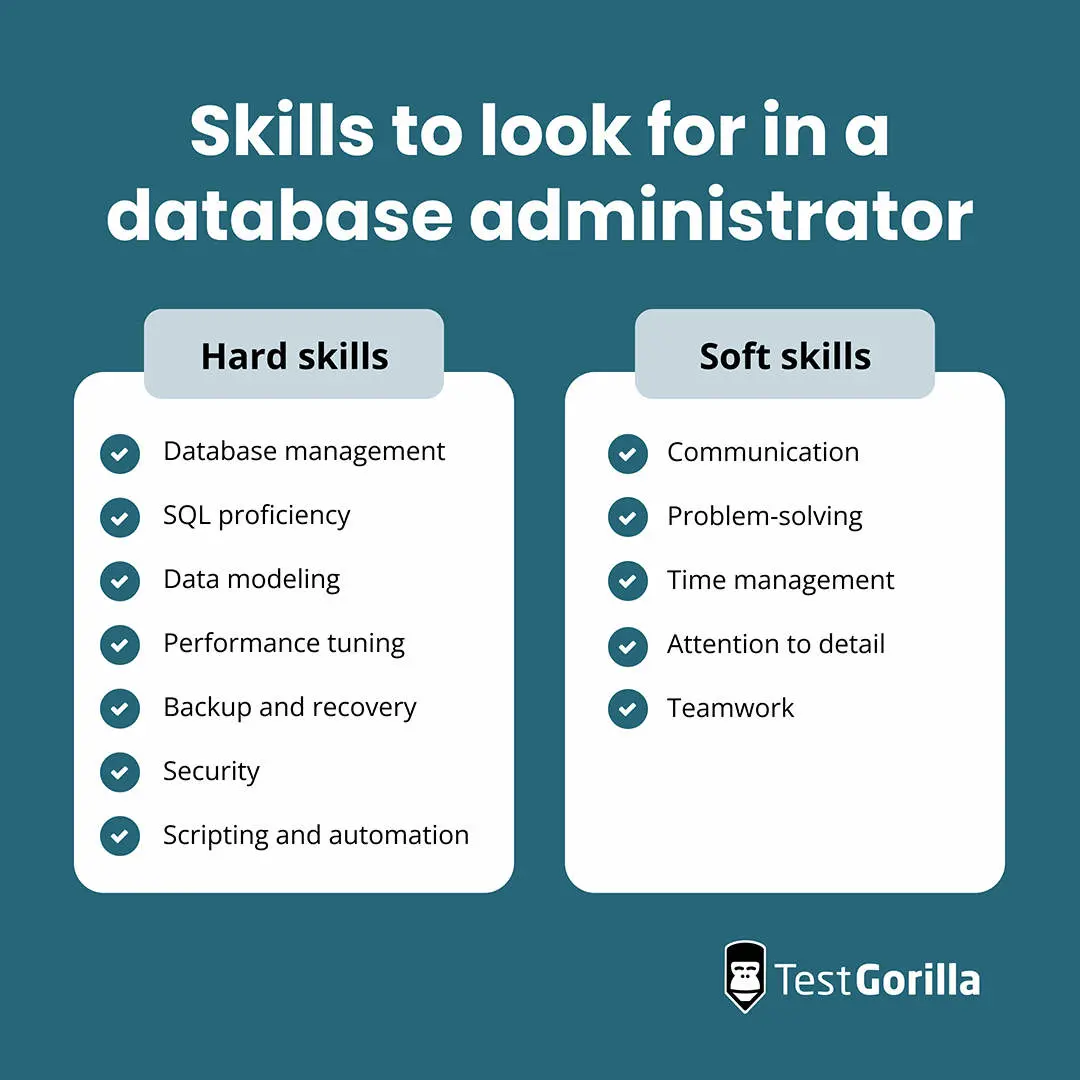Effective database administrators (DBAs) are vital in managing your company’s data systems, ensuring data integrity, and enhancing operational efficiency.
However, hiring the wrong DBA can lead to data management challenges. They may mishandle databases, increase maintenance costs, and negatively impact your organization's data security and performance.
Luckily, this doesn’t have to be you. We’re here to show you how to attract and hire qualified database administrators.
Below, you'll discover the essential skills and qualities that define a successful DBA, how to assess database professionals, and where to find the best candidates. We also highlight some critical mistakes to avoid when hiring so you can ensure your data is in capable hands.
Table of contents
- What you need to know before you hire a database administrator
- Skills and qualifications to look for in a database administrator
- Where to find skilled database administrators
- How to select the best database administrator candidates
- Common mistakes when hiring a database administrator
- Hire an expert database administrator with TestGorilla
What you need to know before you hire a database administrator
Keep these factors in mind before hiring a database administrator.
Understand the role’s responsibilities
Before you recruit a database administrator, know what goes into the role.
DBAs are more than just tech support for your databases – they’re the growth engineers for your data systems. They ensure databases can scale with your business, preparing for more traffic and maintaining speed as customer numbers increase. DBAs are also forward-thinking and fortify data against threats, crafting backups and recovery strategies for swift action during crises.
Understanding the role’s responsibilities will help you make more informed hiring decisions. You’ll know which technical skills to look for and which personality traits make for adept DBAs.
Define the skill set
Clearly identify the technical and soft skills necessary for a DBA in your organization. For example, you might list in-depth knowledge of database replication, backup systems, and performance as non-negotiables. Or, prioritize soft skills like problem-solving and adaptability.
Defining these requirements will guide you toward a DBA who fits the technical bill and can also navigate the unique challenges your business may face.
Know your database environment
Take stock of your current database environment and infrastructure. Does your company use cloud-based databases, on-premises servers, or a mix of the two? Knowing the environment and technologies used will help you find a professional with direct experience using your database architecture.
Consider your team dynamics
Consider how a DBA will fit into your existing IT team and company culture. For example, will they need to work closely with software developers, system administrators, and data analysts?
Having a clear picture of the collaborative and cross-functional nature of the role will help you identify a technically proficient DBA who’s also a good team player and communicator.
Determine your budget
When budgeting for a database administrator, consider that the average base salary for the role in the US is between $87,000 and $128,000 per year – with variations depending on experience, education, industry, and location.
Additionally, remember to include expenses like bonuses, commissions, health benefits, retirement contributions, and other incentives to attract top-notch talent.
Skills and qualifications to look for in a database administrator
Database administrators need a blend of hard and soft skills to be successful. These include:
Hard skills
Database management: Proficiency in managing various database systems like Oracle, MySQL, or MongoDB, ensuring data integrity, performance optimization, and documentation of processes.
SQL proficiency: Mastery of SQL language to quickly find and change database information, including connecting different data sets (joins) and asking detailed questions (subqueries). This is especially important when hiring an SQL database administrator.
Data modeling: Ability to design efficient database schemas and data models, ensuring scalability and maintainability.
Performance tuning: Ability to identify and resolve performance bottlenecks using tools like query optimization, indexing, and caching techniques.
Backup and recovery: Experience creating reliable backup and recovery strategies to protect data against disasters or data corruption, such as implementing regular automated backups.
Security: Strong understanding of database security principles and best practices, including user access control, encryption, and vulnerability assessment.
Scripting and automation: Proficiency in scripting languages (e.g., Python or PowerShell) for automating routine tasks like data imports, exports, and maintenance.
Soft skills
Communication: Effective communication skills to collaborate with developers, analysts, and stakeholders and ensure everyone understands project goals and how to achieve them.
Problem-solving: Strong analytical and problem-solving skills to quickly diagnose and address database issues, minimizing downtime.
Time management: Excellent time management skills to prioritize tasks and meet deadlines, especially in critical situations like system failures.
Attention to detail: A keen eye for detail to maintain data accuracy and prevent errors in database operations.
Teamwork: Ability to collaborate effectively within various teams or departments, creating a positive and cooperative work environment.
Where to find skilled database administrators
Many companies post job openings for database administrators on websites like LinkedIn and Indeed. These websites can bring in many applicants, but not all will be the best fit for your job.
To find the right DBA, try some different, more creative methods.
3 creative ways to find database administrator candidates
Consider these recruitment sources to find candidates with the right skills.
1. Online communities and forums
Engage with online communities and forums where database administrators frequently share their expertise. Platforms such as DBA Stack Exchange and Reddit's r/Database community are hubs for enthusiastic DBA professionals who actively discuss database management topics.
These communities allow you to identify experts and establish direct connections with them.
2. Use specialized platforms
Consider using specialized recruitment platforms, such as Otta and Dice, that focus on tech-savvy talent. You can access a pool of pre-screened candidates who likely have the precise data management, IT, and tech skills you're looking for.
3. University partnerships
Partner with universities and colleges offering database-related programs. Collaborate on student projects, offer internships, or sponsor database-related competitions. This engagement not only helps you identify promising talent early but also allows you to shape and nurture future DBAs.
How to select the best database administrator candidates
After you’ve gathered applications for your open role, it’s time to evaluate them. The easiest and most effective way to do this is by using a pre-employment screening platform like TestGorilla. We offer specialized tests to evaluate essential technical and interpersonal skills for DBA roles, helping you select the best-fit candidates.
Here are a few tests we recommend to evaluate your applicants:
TestGorilla’s Database Management and Administration test evaluates candidates’ understanding of fundamental methods for providing data to applications, managing performance, and securing data.
Our Working with Data test identifies candidates who can handle data correctly and perform basic data analysis.
The SQLite Online Coding test assesses candidates’ ability to work with low-complexity databases and database design.
Our Problem-solving test measures skills in identifying issues and examining data and written content to make accurate decisions.
TestGorilla’s Communication Skills test evaluates your candidates' ability to communicate clearly and professionally.
Our Time Management test offers pre-existing templates to assess candidates’ time management skills catered to your specific role.
Personality assessments like the Enneagram, Big 5 (OCEAN), and the DISC tests give you insight into DBA candidates’ motivations, values, and interpersonal abilities.
Once assessment results are in, you can move to the interview stage with your top candidates. Check out our list of 48 DBA interview questions for ideas on what to ask.
You can also use more platform-specific questions like these SQL Server questions or our Oracle DBA questions.
Common mistakes when hiring a database administrator
Avoid these pitfalls when hiring a database administrator.
1. Ignoring soft skills
While technical skills are essential, overlooking soft skills can cause issues. Database administrators don’t work in isolation – they must know how to collaborate with existing teams. They also need strong communication and problem-solving skills to keep everyone on the same page and resolve issues quickly.
For example, say a database administrator needs to help the marketing team understand how to use customer data. If the DBA can't explain this clearly, the marketing team might make mistakes in their campaigns.
Focusing on both technical and interpersonal skills when searching for a DBA will help you find the best, most well-rounded candidate.
2. Making a hasty hire
Rushing to hire a database administrator without proper evaluations can lead to costly mistakes. For instance, if you skip reference checks and later discover that the DBA has a history of not properly securing databases, your organization might face security breaches and data leaks.
Taking the time to vet candidates carefully ensures the candidate you hire has a strong track record of security best practices, which is crucial for protecting your sensitive data and maintaining the integrity of your systems.
3. Overlooking documentation skills
DBAs must document how they set up and manage databases. Otherwise, it can be difficult for others to understand how the databases are configured. This can cause delays when fixing problems or when a new DBA takes over the role.
So, don't underestimate a DBA's ability to document their work – it's like having a recipe that others can follow easily.
Hire an expert database administrator with TestGorilla
Hiring a database administrator isn’t just about filling a role. It's about finding an expert to manage your data effectively and work well with your existing teams.
Overlooking the nuances of this role can lead to data problems, increased costs, and reduced system efficiency.
Fortunately, TestGorilla offers a range of online tests customized for evaluating DBA candidates. From database management assessments to personality and cultural add evaluations, we have everything you need to identify the right candidate for your data management needs.
Start your hiring process today by signing up for a free account. You can also book a free live demo or take a quick product tour to discover all that TestGorilla has to offer.
Related posts
Hire the best candidates with TestGorilla
Create pre-employment assessments in minutes to screen candidates, save time, and hire the best talent.
Latest posts
The best advice in pre-employment testing, in your inbox.
No spam. Unsubscribe at any time.

Hire the best. No bias. No stress.
Our screening tests identify the best candidates and make your hiring decisions faster, easier, and bias-free.
Free resources
This checklist covers key features you should look for when choosing a skills testing platform
This resource will help you develop an onboarding checklist for new hires.
How to assess your candidates' attention to detail.
Learn how to get human resources certified through HRCI or SHRM.
Learn how you can improve the level of talent at your company.
Learn how CapitalT reduced hiring bias with online skills assessments.
Learn how to make the resume process more efficient and more effective.
Improve your hiring strategy with these 7 critical recruitment metrics.
Learn how Sukhi decreased time spent reviewing resumes by 83%!
Hire more efficiently with these hacks that 99% of recruiters aren't using.
Make a business case for diversity and inclusion initiatives with this data.


















